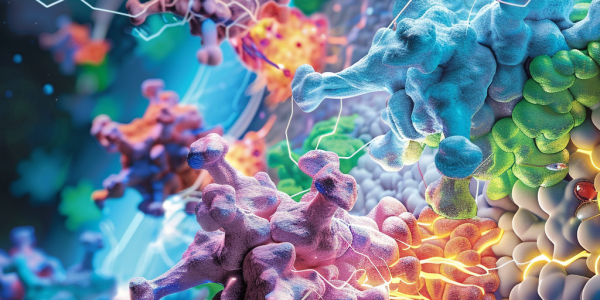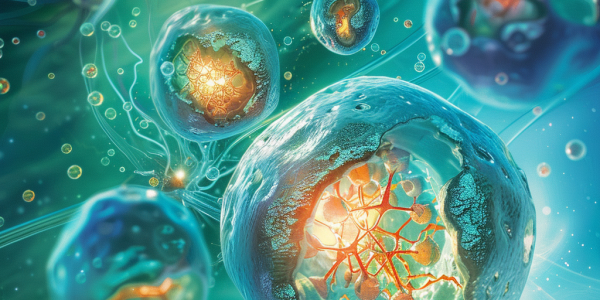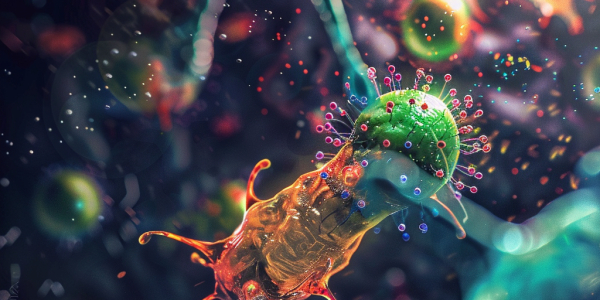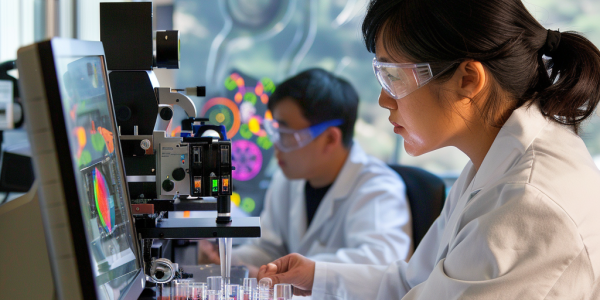AI Model SPOT Revolutionizes Understanding of Transport Proteins in Cells
Heinrich Heine University Düsseldorf researchers have developed SPOT, an AI-driven model that predicts the substrate specificity of transport proteins, enhancing our understanding of cellular transport mechanisms. This breakthrough could revolutionize drug delivery systems and accelerate discoveries in cellular biology.
Breakthrough Method Detects CO2-Derived Oxidant in Human Cells
Recent research from the University of São Paulo reveals a groundbreaking method for detecting peroxymonocarbonate, a significant biological oxidant derived from carbon dioxide (CO2) in human cells. This study highlights the physiological effects of elevated CO2 levels, particularly in urban environments, and emphasizes the urgent need to understand CO2 toxicity mechanisms and their implications for human health.
Scientists Discover ‘Third State’ Beyond Life and Death
Scientists have discovered a ‘third state’ beyond life and death, challenging traditional perceptions of existence. This groundbreaking research reveals that certain cells, particularly those involved in organ donation, remain active post-mortem, offering new insights into regenerative medicine and organ preservation. The findings could redefine our understanding of life and death, prompting both scientific and philosophical discussions about existence.
Stanford’s CRISPRkit Revolutionizes Science Education with Affordable Gene-Editing Experiments
The newly launched CRISPRkit from Stanford University is revolutionizing science education by providing affordable gene-editing experiments for classrooms. Priced at just $2 per kit, this innovative tool allows students to engage in hands-on learning about CRISPR technology, bridging the gap between theory and practice. With its potential to democratize access to advanced biology, CRISPRkit empowers the next generation of scientists and fosters inclusivity in STEM education.
Uncovering STING Protein’s Role in Cellular Aging and Health
Recent research from the University of Pittsburgh reveals the pivotal role of the STING protein in cellular aging and stress management. This groundbreaking study highlights STING’s dual functions in inflammation and cellular protection, suggesting new therapeutic strategies for age-related diseases. Discover how STING activation enhances lysosome production and autophagy, promoting cellular health and longevity.
Study Explores Photosynthesis Potential Under K-Dwarf Stars
A recent study investigates how photosynthetic organisms, including garden cress and cyanobacteria, perform under light from K-dwarf stars. Findings suggest these organisms can thrive in such environments, expanding our understanding of potential life on exoplanets. This research highlights the adaptability of life beyond Earth and underscores the importance of exploring various stellar conditions in astrobiology.
Virginia Tech Study Reveals Insights into Bacterial Movement and Antibiotic Resistance
A groundbreaking study from Virginia Tech reveals critical insights into bacterial movement, specifically twitching motility, which poses challenges in the fight against antibiotic resistance. Led by undergraduate Megan O’Hara, this research highlights how bacteria colonize surfaces and the influence of environmental factors on their behavior. Published in mSphere, the findings underscore the urgency of developing innovative strategies to combat antibiotic-resistant infections, a growing global health threat.
New Study Reveals Complex Dynamics of Phage Infections and Their Implications
A groundbreaking study by researchers from the University of Illinois Urbana-Champaign and Texas A&M University reveals new insights into phage infections and their impact on bacterial cells. Published on August 5, 2024, this research explores how multiple phages interact during infection, potentially influencing phage therapy as an alternative to antibiotics. The findings highlight the complex dynamics of phage biology, with implications for both medical and ecological applications.
UCLA Develops Breakthrough in 3D Quantitative Phase Imaging Technology
UCLA researchers have revolutionized 3D quantitative phase imaging (QPI) with a new wavelength-multiplexed diffractive optical processor, enhancing imaging efficiency and speed for biomedical diagnostics, material characterization, and environmental analysis. This breakthrough enables label-free imaging, preserving sample integrity while offering high-resolution insights across multiple planes, crucial for studying complex biological structures.
Scientists Propose Lunar Biorepository to Preserve Earth’s Biodiversity
Scientists propose a revolutionary lunar biorepository to preserve Earth’s biodiversity amidst climate change and habitat loss. This innovative facility aims to store critical biological samples, including DNA from endangered species, in the moon’s frigid environment, ensuring their survival against extinction. As climate threats escalate, this groundbreaking concept could redefine conservation strategies and safeguard genetic diversity for future generations.










